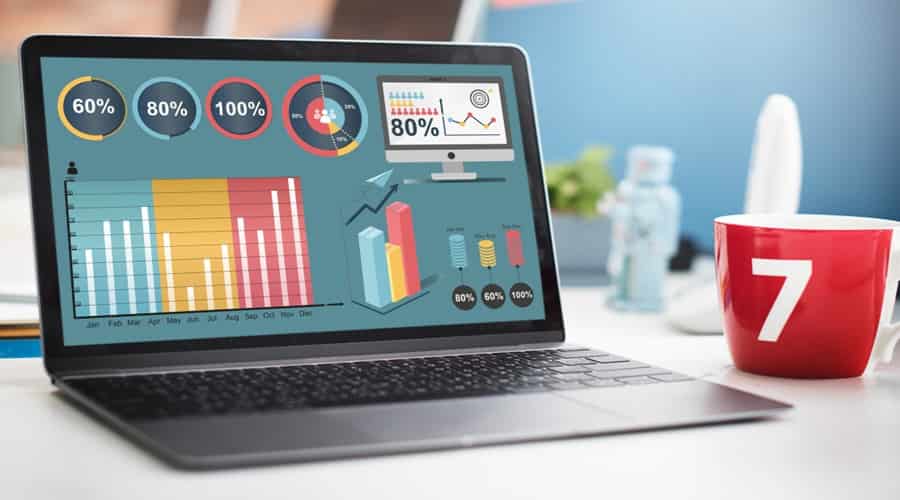
Social Media Analytics Tools: Comprehensive Guide 2025
Understanding your overall social media performance is indispensable for effective advertising in the virtual age. Social media analytics equipment provides valuable insights into how your content material is acting, helping you make records-driven decisions. This guide will cover everything you want to recognize about media analytics tools and their advantages and provide a way to pick the proper one for your commercial enterprise.
What are Social Media Analytics Tools?
Social media analytics tools are software programs that collect and examine data from social media channels. This equipment helps corporations understand the performance of their social media campaigns by tracking engagement, attainment, and follower growth metrics. By using those tools, groups can gain insights into their target audience’s behavior, picks, and developments, permitting them to optimize their social media strategies.
Key Features of Social Media Analytics Tools
Social media analytics tools offer a variety of features designed to help businesses understand and optimize their presence on social media platforms. Some key features include:
Data Tracking and Monitoring:
Social media analytics gear songs and monitor diverse metrics across multiple channels, including likes, shares, remarks, and mentions. This permits agencies to gain insights into their target market’s engagement and sentiment closer to their emblem.
Audience Insights:
These tools offer demographic information about the audience, including age, gender, place, and pastimes. This facilitates organizations’ understanding of their target market and tailoring their content and advertising strategies.
Competitor Analysis:
Social media analytics equipment permits organizations to screen their competition’s activities on social media. This includes tracking their followers, engagement metrics, and content material performance, permitting corporations to perceive opportunities and stay ahead of the competition.
Content Performance Analysis:
Organizations can analyze the performance of their social media content, such as posts, pictures, and videos. This consists of metrics including attain, engagement fee, click-through fee, and conversion fee, supporting organizations in becoming aware of top-appearing content and optimizing their content strategy.
Campaign Tracking:
Social media analytics tools allow organizations to track the performance of their social media campaigns in real-time. This includes monitoring marketing campaign reach, engagement, and conversion metrics, permitting companies to measure the effectiveness of their campaigns and make record-pushed choices.
Sentiment Analysis:
These tools analyze the sentiment of social media mentions towards the brand, products, or specific topics. This helps businesses gauge the overall sentiment of their audience and identify any negative feedback or issues that need to be addressed.
Reporting and Visualization:
Social media analytics tools provide customizable reporting and visualization capabilities, allowing businesses to create visually appealing reports and dashboards. This makes communicating insights and performance metrics easy for stakeholders and decision-makers.
Integration with Third-Party Tools:
Many social network analytics solutions feature integration with third-party tools, including advertising platforms, email marketing platforms, and CRM systems. This allows businesses to centralize their data across several systems and optimize workflows.
Benefits of Using Social Media Analytics Tools
Insight into Audience Behavior:
Tools for social media analytics provide insightful records about audiences’ preferences, hobbies, and behavior. By analyzing indicators like engagement quotes, demographics, and content alternatives, groups may better understand their audience and create content and advertising strategies to appeal to their target demographic.
Measurable ROI:
Groups may additionally use social media analytics equipment to reveal the effectiveness of their social media projects and calculate their return on investment (ROI). Companies can examine the success of their social media advertising and marketing tasks and make facts-driven choices to maximize ROI by examining indicators like conversion fees, click-thru prices, and earnings from social media campaigns.
Competitive Analysis:
Those tools permit groups to reveal the sports in their competitors on social media and benchmark their overall performance in opposition to enterprise peers. By analyzing metrics such as follower growth, engagement fees, and content material performance, groups can perceive areas of opportunity, stay ahead of the competition, and differentiate themselves within the marketplace.
Enhanced Content Strategy:
Social media analytics tools offer insights into the overall performance of social media content material, consisting of posts, photos, and movies. By studying metrics, which include reach, engagement, and click-on-through fees, corporations can pick out pinnacle-performing content material and comprehend what resonates with their audience. This allows organizations to optimize their content method, create more engaging content, and pressure better results.
Real-Time Monitoring and Crisis Management:
Those tools enable agencies to reveal social media mentions in real-time and respond quickly to customer inquiries, feedback, and court cases. By monitoring sentiment evaluation and identifying potential problems early on, companies can mitigate negative comments, manage crises efficaciously, and maintain high-quality brand popularity.
Data-Driven Decision Making:
Social media analytics equipment offers agencies actionable insights and data-driven tips to inform decision-making. By reading traits, analyzing styles, and predicting outcomes, agencies can make informed decisions about their social media method, content material introduction, audience focus, and budget allocation.
Improved Customer Engagement:
By appreciating target audience conduct and alternatives, corporations can tailor their social media content material and interactions to better engage with their target market. By reading metrics, including response instances, engagement fees, and sentiment evaluation, companies can improve customer pleasure, foster brand loyalty, and build more potent relationships with their target market.
Optimized Advertising Campaigns:
Social media analytics gear offers insights into the performance of social media marketing campaigns, including advert reach, engagement, and conversion metrics. By reading marketing campaign performance and target market insights, organizations can optimize their ad targeting, creative messaging, and budget allocation to maximize ROI and achieve their advertising targets.
Types of Social Media Analytics Tools
Social Media Monitoring Tools:
These tools track and monitor social media mentions, conversations, and trends related to a brand, product, or topic. They provide insights into audience sentiment, brand perception, and competitive intelligence.
Social Media Listening Tools:
Social media listening focuses on appreciating audience conversations and sentiments across diverse social media systems. Listeners examine keywords, hashtags, and mentions to gauge target audience sentiment and discover traits.
Social Media Engagement Tools:
This equipment helps businesses tune and measure their social media engagement metrics, which include likes, stocks, feedback, and mentions. It provides insights into audience engagement tiers and assists agencies in identifying possibilities to enhance engagement.
Social Media Analytics Platforms:
Social media analytics systems offer complete analytics and reporting abilities across several channels. They track key metrics such as reach, engagement, impressions, and conversions, offering businesses actionable insights to optimize their social media methods.
Influencer Marketing Platforms:
These platforms facilitate influencer discovery, collaboration, and campaign management for businesses leveraging influencer marketing on social media. They help businesses identify relevant influencers, track campaign performance, and measure ROI.
Competitor Analysis Tools:
Competitor evaluation equipment displays the competition’s social media sports and overall performance. It shows metrics that include follower increase, engagement costs, and overall content performance, helping groups benchmark their performance against the competition and identify areas for development.
Social Media Reporting Tools:
These gear automate the creation and generating of social media reviews and dashboards. They aggregate records from multiple social media channels and provide customizable reporting templates, making it easy for businesses to track and analyze their social media overall performance.
Social Media Listening and Brand Monitoring Tools:
These tools focus on brand monitoring and reputation management by tracking mentions, reviews, and conversations related to a brand across social media platforms. They provide insights into brand sentiment, customer feedback, and crisis management opportunities.
Social Media Advertising Analytics Tools:
Those gear songs and the performance of social media advertising and marketing campaigns. They analyze metrics with advert achievement, engagement, click-on on-thru fees, and conversions, helping organizations optimize ad targeting and innovative messaging for higher ROI.
Social Media Content Analytics Tools:
These tools analyze the performance of social media content, including posts, images, and videos. They track metrics such as reach, engagement, and virality, providing insights into content effectiveness and audience preferences.
Top Social Media Analytics Tools
Sprout Social
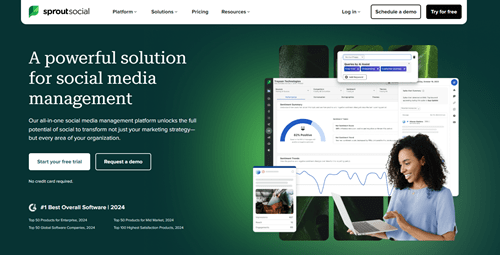
Sprout Social is a comprehensive social media management and analytics platform designed to help businesses effectively manage their social media presence. It offers features for social media scheduling, monitoring, analytics, and reporting across multiple channels.
Pros:
Intuitive interface, robust analytics and reporting capabilities, social listening features, and excellent customer support.
Cons:
Higher pricing compared to some competitors, advanced features may require additional subscription tiers.
Services Provided:
Social media scheduling, monitoring, analytics, reporting, and social listening.
Pricing Package:
Sprout Social offers tiered pricing plans starting at a monthly subscription fee, with additional features in higher-tier plans.
Hootsuite
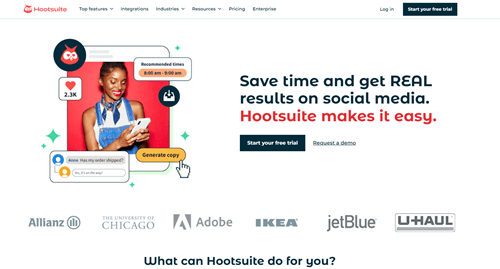
Hootsuite is a famous social media management platform with analytics and reporting features. It allows companies to schedule posts, reveal social media conversations, and assess their social media overall performance across diverse channels.
Pros:
Extensive integrations with third-party apps and platforms, customizable analytics dashboards, and team collaboration features.
Cons:
New users have a steeper learning curve; pricing may be higher for larger teams or enterprise-level features.
Services Provided:
Social media scheduling, monitoring, analytics, reporting, and team collaboration.
Pricing Package:
Hootsuite offers tiered pricing plans based on the number of users and social profiles, with custom plans offering more business-degree functions.
Buffer
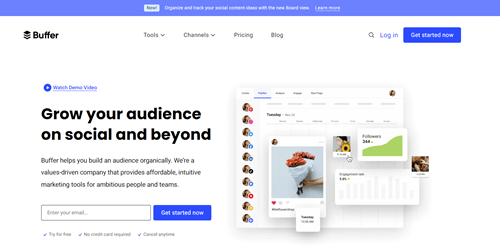
Buffer is a social media control platform with built-in analytics functions. It allows organizations to schedule posts, analyze performance metrics, and measure engagement across diverse social media channels.
Pros:
Easy-to-use interface, customizable scheduling options, in-depth analytics, and reporting features.
Cons:
Limited social listening capabilities, fewer features compared to some competitors, and pricing may be higher for additional features.
Services Provided:
Social media scheduling, analytics, reporting, and team collaboration.
Pricing Package:
Buffer gives tiered pricing plans based on the range of social accounts and further features required, with pricing beginning at a monthly subscription fee.
Socialbakers
Socialbakers is an AI-powered social media marketing platform that offers analytics and benchmarking features. It gives businesses insights into audience behavior, content performance, and competitive analysis across various social media platforms.
Pros:
AI-driven insights and recommendations, competitive benchmarking features, and customizable analytics dashboards.
Compared to competitive price, it maypricesore suitable for larger enterprises or agencies.
Services Provided:
Social media analytics, benchmarking, competitive analysis, and content performance tracking.
Pricing Package:
Socialbakers offers customized pricing plans based on specific business needs and requirements, with pricing available upon request.
Google Analytics
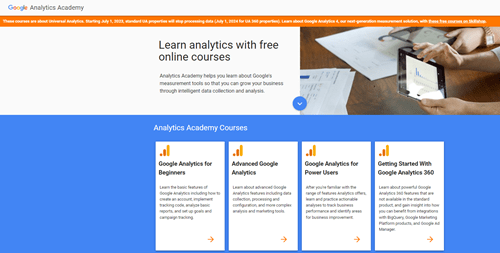
While no longer completely a social media analytics device, Google Analytics provides powerful functions for monitoring social media site visitors and conversions on websites. It allows agencies to investigate the effectiveness of their social media advertising and marketing efforts and the degree of the impact onernet web page traffic and conversions.
Pros:
Free to use, robust analytics features, integration with other Google products, customizable reporting.
Cons:
Limited social media-specific features may require additional setup to track social media referrals accurately.
Services Provided:
Website traffic analysis, conversion tracking, goal setting, and custom reporting.
Pricing Package:
Google Analytics is free to use, with additional features available in Google Analytics 360 for enterprise-level users.
Implementation and Integration
Implementing and integrating social media analytics tools are crucial to leveraging their full business potential. Here’s a guide to effectively implement and integrate these tools:
Needs Assessment:
Begin by determining the particular goals for using social media analytics gear. Decide the important metrics and insights to measure social media’s overall performance and inform decision-making.
Research and Selection:
Research unique social media analytics tools available in the marketplace and evaluate their functions, pricing, and compatibility with your business desires. Pick a device that aligns with your requirements and provides the quintessential analytics competencies.
Customization and Configuration:
Customize the selected social media analytics tool to align with your business processes and objectives—Configure settings, dashboards, and reporting templates to capture relevant metrics and insights.
Data Integration:
Integrate the social media analytics tool with other relevant systems and platforms, such as social media channels, CRM systems, and marketing automation platforms. Ensure seamless data flow and synchronization between systems to centralize data and improve visibility.
Data Collection and Setup:
Set up record collection mechanisms to capture relevant social media data like likes, stocks, remarks, and mentions. Configure monitoring parameters and tags to correlate social media interactions with specific campaigns or initiatives.
Training and Onboarding:
Provide comprehensive training and onboarding sessions for team members using the social media analytics tool. Ensure they understand how to effectively access, interpret, and leverage the analytics insights for decision-making.
Testing and Quality Assurance:
Conduct thorough social media analytics tool testing to ensure data accuracy, reliability, and usability. Test scenarios, workflows, and integrations to identify and address any issues or discrepancies.
Rollout Plan:
Broaden a rollout sketch for deploying the social media analytics tool across your corporation. Define timelines, milestones, and duties to ensure a clean transition and adoption by all stakeholders.
Continuous Improvement:
Display the performance and usage of the social media analytics device frequently. Collect comments from customers and stakeholders to discover areas for improvement and optimization. Be proactive in addressing troubles, enforcing updates, and maximizing the tool’s fee.
Ongoing Support and Maintenance:
Offer ongoing help and maintenance for the social media analytics tool to deal with technical problems, updates, or enhancements. Stay knowledgeable about new functions and exceptional practices to ensure the device meets evolving business needs successfully.
Common Challenges and Solutions
Common Challenges and Solutions in Implementing Social Media Analytics Tools:
Data Quality and Accuracy:
Challenge:
Ensuring the quality and accuracy of social media data collected by analytics tools can be challenging due to data consistency and inaccuracies.
Solution:
Implement information validation techniques to confirm the accuracy and completeness of social media records. Often AUD, it records assets and implements records cleaning techniques to deal with inconsistencies and mistakes.
Integration Complexity:
Challenge:
Integrating social media analytics tools with existing systems and platforms, such as CRM and marketing automation tools, can be complex and time-consuming.
Solution:
Work closely with IT and software providers to streamline the integration process. Utilize standardized APIs and data formats to facilitate seamless data exchange between systems. Prioritize integration with key systems to centralize data and improve visibility.
Limited Resources and Expertise:
Challenge:
Businesses also lack the necessary resources and expertise to put in force and use social media analytics equipment efficaciously.
Solution:
Invest in training and development programs to enhance the skills and knowledge of team members responsible for using social media analytics tools. Leverage external consultants or vendors for specialized expertise and support.
Data Privacy and Compliance:
Challenge:
Ensuring compliance with data privacy regulations, such as GDPR and CCPA, can be challenging when collecting and analyzing social media data.
Solution:
Implement strong data privacy rules and methods to ensure compliance with applicable regulations. Get customers’ consent before accumulating and analyzing their social media facts. Use anonymization and pseudonymization strategies to shield consumer privacy.
Scaling Analytics Capabilities:
Challenge:
Scaling social media analytics capabilities to accommodate social media data’s growing volume and complexity can be challenging.
Solution:
Invest in scalable analytics solutions that can handle large volumes of social media data and adapt to changing business needs. Utilize cloud-based analytics platforms and distributed computing technologies to scale analytics capabilities effectively.
Interpreting and Acting on Insights:
Challenge:
Interpreting and translating social media analytics insights into actionable strategies and initiatives can be challenging for businesses.
Solution:
Develop a clear framework for analyzing and interpreting social media analytics insights. Establish key performance indicators (KPIs) and benchmarks to measure success. Collaborate cross-functionally to develop and implement strategies based on insights derived from social media analytics.
Managing Stakeholder Expectations:
Challenge:
It can be challenging to manage stakeholder expectations and demonstrate the value of social media analytics initiatives to senior leadership and other stakeholders.
Solution:
Communicate the benefits and impact of social media analytics initiatives effectively to stakeholders. Provide regular updates and reports showcasing the value generated by social media analytics, such as improved engagement, increased brand awareness, and higher ROI.
Adapting to Platform Changes:
Challenge:
Social media platforms frequently update their algorithms and features, which can impact data collection and analytics capabilities.
Solution:
Stay informed about platform changes and updates through official communications and industry news sources. Monitor the impact of platform changes on social media analytics performance and adjust strategies and tactics accordingly.
Future Trends in Social Media Analytics
Advanced AI and Machine Learning:
The future of social media analytics will see increased integration of advanced artificial intelligence (AI) and machine learning (ML) technologies. AI-powered algorithms will enable more accurate sentiment analysis, trend prediction, and content recommendation, providing deeper insights into audience behavior and preferences.
Predictive Analytics:
Predictive analytics will play a widespread role in the destiny of social media analytics. By studying historical information and styles, predictive analytics algorithms will forecast destiny trends, become aware of rising topics, and expect target audience behavior, empowering organizations to proactively adapt their social media strategies.
Real-Time Analytics:
As real-time analytics capabilities become more widespread in social media analytics equipment, organizations can screen and respond to social media conversations and developments in real-time. Real-time dashboards and signals will offer immediate insights, permitting agencies to capitalize on opportunities and mitigate risks immediately.
Cross-Channel Integration:
The future of social media analytics will involve greater integration of data from multiple social media channels and other digital touchpoints. Cross-channel analytics platforms will provide a unified view of customer interactions across social media platforms, websites, mobile apps, and other digital channels, enabling businesses to gain holistic insights into customer behavior.
Emotion and Sentiment Analysis:
Social media analytics tools will become more sophisticated in emotion and sentiment analysis, allowing businesses to detect subtle nuances in audience sentiment and emotions. Advanced sentiment analysis algorithms will analyze text, images, and video content to gauge audience reactions and emotional responses, providing deeper insights into brand perception and customer sentiment.
Visual Analytics:
Visual analytics abilities will evolve, allowing organizations to investigate and interpret the visual content of photographs and motion pictures shared on social media. Photograph recognition and video evaluation algorithms will extract valuable insights from visible content material, allowing companies to apprehend trends, identify influencers, and monitor emblem mentions more efficiently.
Privacy and Ethical Considerations:
With growing worries about data privacy and ethical use of data, the future of social media analytics will place more emphasis on privacy-maintaining analytics techniques and moral records practices. Businesses will want to prioritize transparency, consent, and data protection to maintain trust and comply with rules, including GDPR and CCPA.
Augmented Reality (AR) Analytics:
As augmented reality (AR) becomes more prevalent in social media marketing campaigns, AR analytics will emerge as a new frontier in social media analytics. Businesses will leverage AR analytics tools to measure the effectiveness of AR experiences, track user interactions, and analyze engagement metrics in augmented reality environments.
Voice Analytics:
With the rise of voice-activated devices and voice-based interactions on social media platforms, voice analytics will become increasingly important. Voice analytics tools will analyze spoken interactions, voice search queries, and audio content on social media, providing insights into user intent, sentiment, and preferences.
Blockchain for Data Verification:
Blockchain technology will be utilized for data verification and authentication in social media analytics, ensuring the integrity and transparency of social media data. Blockchain-based solutions will enable businesses to verify the authenticity of social media content, track content ownership, and prevent data tampering and manipulation.
Frequently Asked Questions (FAQs)
How can social media analytics help improve my marketing strategy?
Social media analytics provides valuable insights into audience demographics, engagement metrics, and content performance. This information enables you to refine your marketing strategy, target the right audience, and optimize your messaging for better results.
What are the key metrics I should track with social media analytics?
Key metrics to music with social media analytics encompass engagement price, attain, impressions, click-on-through charge, conversion fee, and sentiment evaluation. These metrics provide treasured insights into target market conduct and the effectiveness of your social media efforts.
How can I use social media analytics to measure ROI?
Social media analytics can help degree ROI by monitoring conversion rates, lead generation, consumer acquisition costs, and revenue attributed to social media campaigns. By analyzing these metrics, you can examine the impact of your social media efforts on enterprise outcomes and calculate ROI.
What are the best practices for interpreting social media analytics insights?
Best practices for interpreting social media analytics insights include setting clear objectives, benchmarking performance against KPIs, analyzing trends over time, comparing against competitors, and identifying actionable insights to inform decision-making and strategy adjustments.
How can I leverage social media analytics to improve customer engagement?
Social media analytics can help improve customer engagement by analyzing audience preferences, sentiment, and feedback. By identifying popular content material topics, responding to client inquiries promptly, and personalizing interactions, you can enhance engagement and construct more potent relationships with your audience.
What are the privacy implications of using social media analytics tools?
Social media analytics gear increases privacy considerations associated with records series, personal consent, and records protection. It is crucial to conform with privacy regulations, which include GDPR and CCPA, gain consumer consent for information collection, and ensure information protection and confidentiality to shield consumer privacy.
Conclusion
In conclusion, social media analytics equipment provides helpful insights and capabilities for businesses striving to navigate the dynamic panorama of social media correctly. By leveraging these tools to tune key metrics, degree ROI, and benefit from a deeper grasp of target market behavior, groups can refine their advertising strategies, enhance purchaser engagement, and power commercial enterprise increase. However, using social media analytics with a dedication to moral statistics practices, privacy compliance, and non-stop mastering is fundamental. With the proper strategies and practices in the area, businesses can harness the energy of social media analytics to live aggressively, adapt to changing tendencies, and achieve their advertising goals in an increasing number of virtual global.




